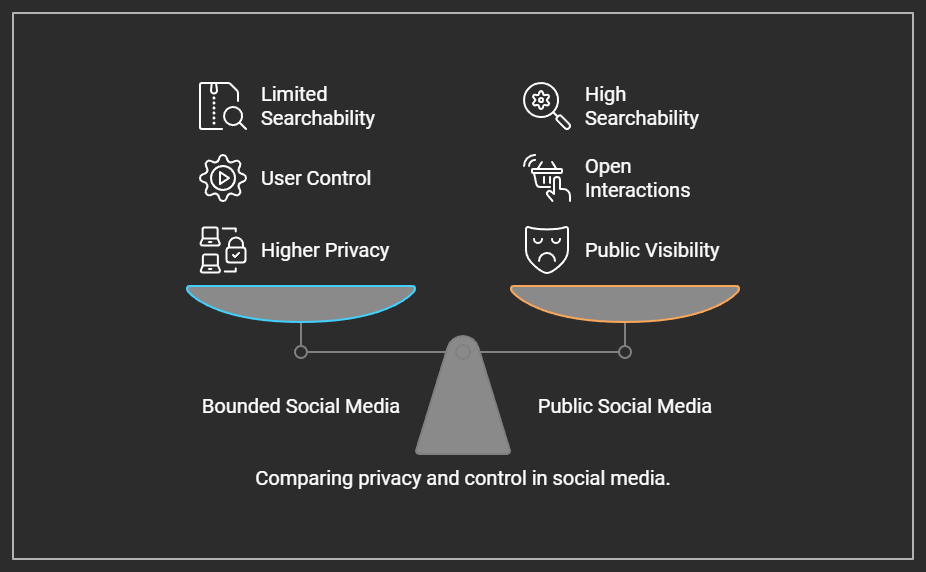Source:
Malhotra, P. (2024). “What You Post in the Group Stays in the Group”: Examining the Affordances of Bounded Social Media Places. Social Media + Society, 10(3). https://doi.org/10.1177/20563051241285777
In the latest episode of Marketing Science Lab, we take a deep dive into groundbreaking research on Bounded Social Media Places (BSMPs) and their implications for digital marketing strategies. The study, published in Social Media + Society, reveals how these private online spaces are changing the way users interact and consume content, presenting both challenges and opportunities for marketers.
What Are Bounded Social Media Places?
BSMPs are low-visibility areas within social media platforms, characterized by restricted access and limited searchability. Examples include private WhatsApp chats, closed Facebook groups, and invite-only Discord servers. These digital spaces offer users a sense of privacy and control over their online interactions, contrasting sharply with the public nature of traditional social media posts.
Key Characteristics of BSMPs
The research identifies three primary affordances of BSMPs that marketers need to understand:
Limited Visibility: BSMPs discourage broad, unintended audience reach. Users perceive their content as private due to platform settings and trust in their known audience.
Enhanced Personalization: These spaces encourage both receiver-oriented and sender-oriented personalization. Users believe they receive more relevant content from known audiences, and the absence of algorithms is perceived as giving users more control over their information environment.
Increased Synchronicity: BSMPs facilitate immediate feedback and continuous conversations. This is influenced by technological features like "presence" indicators and social norms within groups.
Implications for Marketers
The rise of BSMPs presents a paradigm shift in social media marketing. Here are some key takeaways for marketing professionals:
Rethink Content Strategy: Instead of focusing solely on viral, widely-shared content, consider creating more intimate, targeted experiences for specific communities.
Leverage Community Building: BSMPs offer unique opportunities to foster loyal customer bases. For example, a closed Facebook group for early adopters of a new tech product could provide valuable insights and feedback.
Adapt Influencer Marketing: The study suggests that micro-influencers might have highly engaged audiences in these private spaces. This could mean shifting focus from public follower counts to an influencer's ability to drive meaningful conversations in private groups.
Prioritize Trust and Transparency: Users in BSMPs expect a higher level of privacy and authenticity. Brands must be transparent about their presence and intentions in these spaces to maintain trust.
Develop New Metrics: Traditional engagement metrics may not apply in BSMPs. Consider focusing on metrics like sentiment analysis, community growth, and quality of interactions rather than just reach numbers.
Challenges and Opportunities
While BSMPs offer exciting new avenues for engagement, they also present challenges. Marketers must balance the desire for data collection and ROI measurement with respect for user privacy expectations. However, the potential for deep, meaningful customer relationships in these spaces could prove invaluable for brand loyalty and product development.
Future Trends
As social media continues to evolve, we anticipate a growing emphasis on quality over quantity in user engagement. Marketers who can master the balance of privacy, personalization, and community-building in BSMPs will likely have a significant advantage in the coming years.
Bounded Social Media Places represent a shift towards more intimate, controlled online interactions. By understanding and respecting the unique characteristics of these spaces, marketers can develop strategies that resonate with users and foster genuine connections in an increasingly privacy-conscious digital landscape.













